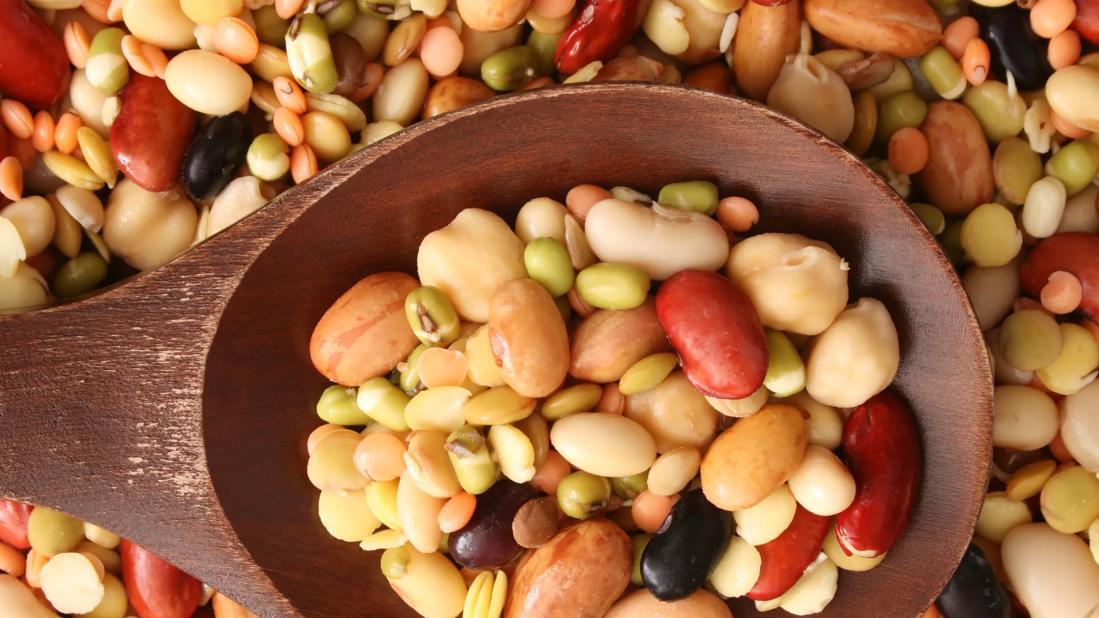6 Big Benefits of Beans
This superfood fights cancer and heart disease, stabilizes blood sugar and helps with weight loss

Beans are nutritional powerhouses. Packed with protein, fiber, antioxidants, vitamins and minerals, they’re a staple in many diets worldwide. Eating beans can help lower cholesterol, maintain healthy blood sugar levels, fight cancer, promote digestive health and even help manage weight.
Types of beans
There are many types of beans, each with its own texture and flavor, says registered dietitian Julia Zumpano, RD, LD. Popular beans include:
- Black beans
- Black-eyed peas
- Cannellini or white kidney beans
- Chickpeas or garbanzo beans
- Fava beans
- Green beans
- Kidney beans
- Lima beans
- Navy beans
- Pinto beans
- Soybeans or edamame
Are beans the same as legumes? “All beans are legumes, but not all legumes are beans,” explains Zumpano. “Legumes are a broader category of plants that includes beans, peas, lentils and peanuts. Beans are one category of legumes that offer unique benefits and tastes.”
6 health benefits of beans
“Beans are a superfood because they’re relatively low in fat and calories and full of nutrients,” says Zumpano.
Here are some top benefits of eating beans.
1. Helps fight diseases
“Beans provide healthy, plant-based protein, and the fiber in beans helps lower the risk of many chronic diseases,” shares Zumpano. “They’re packed with other essential minerals and disease-fighting antioxidants.”
Beans are also a great source of B vitamins, which help keep your brain and nervous system healthy. The exact nutrient profile depends on the specific bean, but in general, they’re good sources of:
- Copper
- Folate
- Iron
- Magnesium
- Manganese
- Potassium
- Thiamine
- Zinc
They’re also full of antioxidants, which help neutralize the harmful effects of free radicals. The antioxidants in beans include:
- Anthocyanins
- Catechin
- Flavonoids
- Polyphenols
- Quercetin
- Vitamin E
2. Improves digestion
Eating more fiber is an excellent way to improve digestion — and your overall health. Beans contain key substances that benefit your gastrointestinal (GI) tract and digestion:
- Insoluble fiber helps prevent constipation.
- Soluble fiber feeds the good bacteria in your gut microbiome, helping you digest food and absorb nutrients better.
- Resistant starch also provides food for your microbiome when it gets broken down by bacteria in your colon.
3. Stabilizes blood sugar
You may think of high blood glucose (sugar) as something only people with diabetes need to worry about. “But even people who don’t have diabetes benefit from avoiding blood sugar spikes — and the inevitable, unpleasant crashes that follow,” notes Zumpano.
Research shows that people who regularly eat beans have lower blood sugar levels, avoiding those troublesome spikes. “Stable blood sugar keeps your energy steady throughout the day,” she adds. “Studies also show that the resistant starch in beans may help reduce the risk of developing Type 2 diabetes.”
4. Aids weight loss
A review of 21 clinical trials concluded that eating beans and other legumes daily resulted in weight loss, even without trying to restrict calories. The same review also concluded that eating beans can reduce body fat.
In another study, participants who ate beans on a calorie-reduced diet for six weeks lost more inches from their waist than those who followed the same calorie restriction without beans.
“Researchers believe the weight loss effect of beans is due to satiety — the feeling of fullness,” says Zumpano. “Beans take longer to digest than simple carbs, and the fiber and protein help you feel satisfied.”
5. Boosts heart health
“Heart disease is widespread, but our food choices can significantly reduce our risk,” says Zumpano. Beans are a powerful part of a heart-healthy diet. The potassium in beans helps you maintain healthy blood pressure.
“The soluble fiber in beans binds around bile in our guts and removes it with the body’s waste,” she continues. “Bile is composed of cholesterol, therefore aiding in the elimination of cholesterol. For every 1 gram of soluble fiber, you can lower your cholesterol by 1%.”
Beans also benefit your heart by reducing:
- Cholesterol
- Coronary heart disease (CHD) risk
- Inflammation
6. Prevents cancer
“No single food can prevent or treat cancer or any other disease,” clarifies Zumpano. “But the beneficial phytonutrients in beans can help lower cancer risk.”
Black beans are particularly high in anthocyanins that protect your cells from DNA damage that can lead to cancer.
How to eat more beans
Incorporating more beans into your diet can be simple and delicious because they fit into almost any meal.
- Try adding them to salads, soups, chilis and stews for a boost of flavor and plant-based protein.
- Blend beans into dips, like hummus or salsa.
- Use them in addition to or instead of meat in tacos. Or try a bean-based patty in place of meat.
- Use them to replace or reduce the flour in baked goods. Like black bean brownies or chickpea chocolate chip cookies.
Go slowly to reduce gas
Some people avoid beans because of the gassy side effects. The fiber in beans can cause gas, and natural sugars, called oligosaccharides, worsen the effect. To reduce gas, Zumpano suggests soaking and rinsing your beans:
- Dry beans: Soak them overnight and cook them thoroughly. Toss out the cooking water and rinse the cooked beans well under running water before eating.
- Canned beans: Rinse the beans well and boil them before eating.
It also helps to start with tiny servings and gradually increase the amount you eat to allow your system to adjust. Consuming them pureed can also help decrease the gassiness effect.
“Even if you don’t think you can tolerate beans, it’s worth trying,” encourages Zumpano. “They’re just so incredibly nutritious.”